We can say the father’s daughter played her part, and played it how she knew best; now, she has journeyed homewards.
By Onyekachi Iloh
Nine months before acclaimed writer, Chinua Achebe, was born in his hometown of Ogidi in Eastern Nigeria, another writer—a different kind of writer, but a writer nonetheless—had been born some three hundred kilometres away in Ondo town, in present day Ondo state.
Like Achebe whose father was a pioneering evangelist, this other writer had for a father a reverend who was instrumental in the spread of Christianity in those days. Just like Achebe, this other writer’s father had the first name of Isaiah.
And like Achebe, who studied English, History, and Theology at the University of Ibadan (then University College, Ibadan), this other writer, who was Achebe’s classmate, earned a BA in English, Latin, and History from the same institution. But unlike Achebe who was a man, this other writer was a woman. Our mystery writer is none other than Mabel Segun—Nigerian poet, broadcaster, educator, athlete, and celebrated writer of children’s literature.
Mabel Segun was born in 1930 and passed away in 2025, the sum total of who she was forever bookended by those two very dissimilar and far-apart figures. Such was the rich length of her life, one abundant in colour and talent.
Segun’s acclaim came in 1965 on the publication of her first novel, My Father’s Daughter, a children’s novel chronicling the life of a girl whose strong and kind father is the reverend in a village.
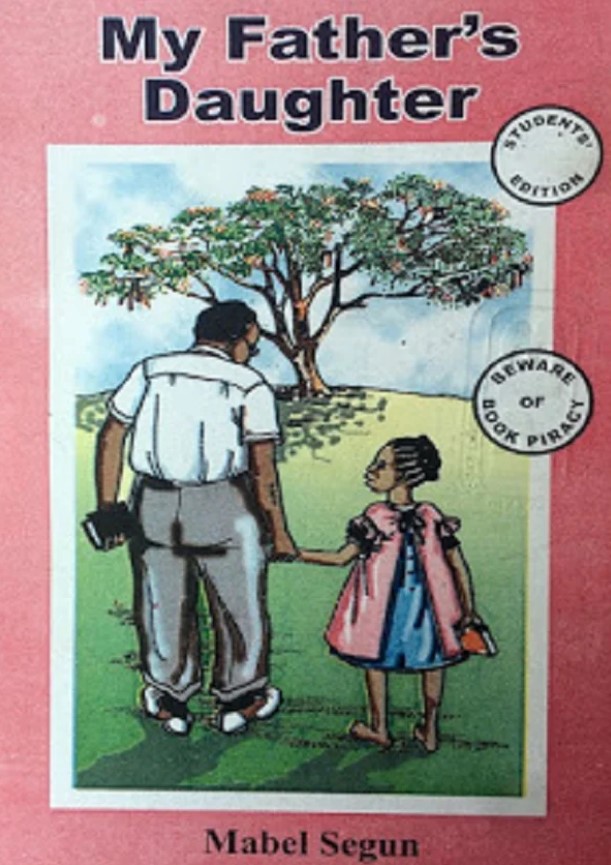
The book, a children’s novel with an autobiographical tilt, is as popular in Nigeria as it is in other parts of the world, and has been translated into several languages including German, Norwegian, Greek, and Danish.
Published by African Universities Press, it was a cultural touchstone for multiple generations of Nigerians, alongside classics such as Kola Onadipe’s Sugar Girl (1964), Anezi Okoro’s One Week One Trouble (1972), and Onuora Nzekwu’s Eze Goes to School (1963), all under the African Universities Press imprint and part of the UBE Reader Boosters initiative.
Following Mabel Segun’s acclaim for contributing to children’s literature in Africa, she was dubbed the ‘matriarch of Nigerian literature’ by Chief Bola Ige, a lawyer and Nigeria’s former Federal Minister of Justice who pursued his degree at University College, Ibadan alongside her.
It is important to note that Mabel Segun’s involvement with literature did not begin at thirty-five years old when she published My Father’s Daughter, but had been a lifelong preoccupation of hers, fostered by the artistic family into which she was born.
One of her younger brothers was Frank Aig-Imoukhuede—journalist, poet, former secretary of the National Council of Arts and Culture, and writer of the well-known collection of pidgin poetry, Pidgin Stew and Sufferhead (1982).
Ikpehare Aig-Imoukhuede, her other brother who was Frank’s senior by a year, was also a writer and a columnist at Vanguard Newspaper. Ikpehare was, alongside Nobel Laureate, Wole Soyinka, one of the seven founding members of The Confraternity of Seadogs at University College, Ibadan.
Her father, the Reverend Isaiah Aigbovbiose Imokhuede, who adopted the Aig-Imokhuede surname for his family, was not just a clergyman; he was also a writer and translator who wrote an account of Ora history, the first primer of the Ora language, and was, as at the time of his death, engaged in the translation of Yoruba hymns into Ora.
He is to be credited for composing Iwe Kikọ, a popular Yoruba song advocating the inclusion of agriculture into formal education. His impact was such that fifty years after his death, he was exhumed from Ondo and taken to his native Ora for a re-burial, but not before being posthumously promoted from an ordinary reverend into an archdeacon.
At university, Mabel Segun was advertisement manager of the student magazine, The University Herald, while Chinua Achebe was the editor. Swamped by the volume of editorial workload, Achebe made her a sort of unofficial assistant, and they often worked on the magazine in his room as there were no designated offices for The Herald.
Expectedly, this raised eyebrows and spawned rumours, earning them a place in the weekly campus paper which made anagrams of their names—Nuachi (Chinua) and Lemba (Mabel)—to avoid culpability.
In 1954, four years before the publication of Things Fall Apart, a short story she wrote as a fresh graduate won the maiden edition of the Nigerian festival of the Arts Literature Prize. Decades later, in 1981, she would be a founding member of the Association of Nigerian Authors established by Achebe.
Throughout Mabel Segun’s life, much to her discomfort, it was commonly misconceived that she was Yoruba, from Ondo. She was not from Ondo—though she was born there—and neither was she Yoruba. She was Edo, from the Aig-Imoukhuede family of the Sabongida Ora area of Edo state.
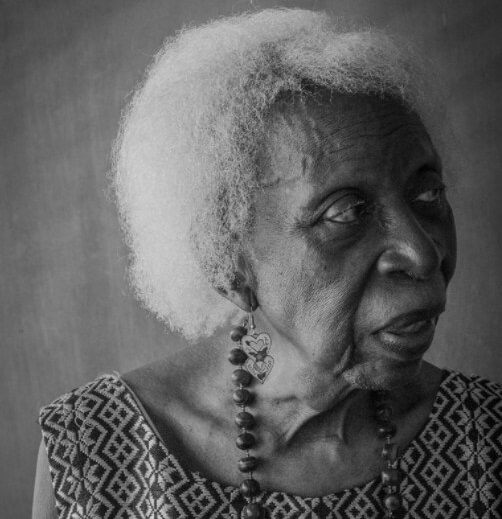
Her father had migrated with his family to Ondo for clerical work, which was how she came to grow in Yorubaland, attending CMS Girls’ School, Lagos, and University College, Ibadan. It can be safely assumed that this misconception isn’t at all helped by her Yoruba last name, which she took upon her marriage to George Segun, a former president of the African Table Tennis Foundation (ATTF) and ex-deputy president of the International Table Tennis Foundation.
Mabel Segun, formerly Mabel Dorothy Aig-Imoukhuede, was no stranger to table tennis herself. As the first female tennis player of note in Nigeria, she made it to the finals of the inaugural National Singles Championships of 1954, which was the first female tournament in Nigeria, where she lost to one Mrs Hunt, the wife of an expatriate.
Before then, she had been a force to reckon with within the sport; while at University College, Ibadan, she had been an ‘honorary male’ at the Men’s Singles Championships. Hers was an illustrious life spent in the shattering of glass ceilings constructed by patriarchal ideas of gender and sexism.
It should however be mentioned that despite transcending these barriers, she vehemently refused to identify as a feminist and thought of the feminist movement as a sham.
“I don’t believe in feminism because women who are into it are fakes. They are doing it to get on. They are doing it for selfish reasons. I have been to a thousand and one conferences and I told the women in feminism long ago, when I was 42, I was doing what they men were doing. Most of them are fakes”, she said in an interview with The News Nigeria.
Mabel Segun’s logic, one soon discovers, was hinged on her lifelong insistence on doing the things her male counterparts did. She mentioned engaging in male-dominated activities such as canoeing and hunting as a young woman, and how rape was never attempted on her because she was one of the boys.
She was, in her words, a “honorary gentleman”. It bothers on the absurd that she held this position when all around her and in her own life there existed real-life examples of female subjugation.
She almost did not receive a secondary school education because, at the time, no one (including her uncle whom she lived with) believed in the education of girls or the idea of a woman sponsoring education. It was decided that she would become a pupil nurse, but she refused because pupil nurses, according to her, often fell victim to teenage pregnancy.
Ironically, she became who we knew her to be, the towering Mabel Segun, due to the resilience of her mother, whose doggedness–and a minor misunderstanding–pushed her into school and saw her through.
Her mother, Eunice Aig-Imoukhuede, was not as fortunate as her daughter in her own time. No one would admit her into a school, even though she badly wanted to receive an education. Since it was socially desired that women be uneducated, every school she went to she was thrown out of, even when she went as far as Benin, some sixty-four miles from Ora.
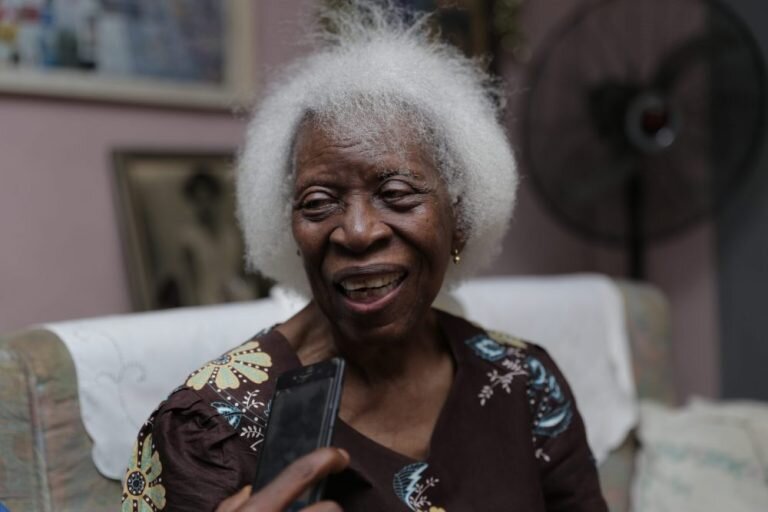
“My mother was great, too. Unfortunately, in those days there was discrimination against women. Each time she went to school, they drove her out. They had inspectors in those days who went into schools. If they saw any girl there, they drove her out. They said, what is a girl doing here? That girls were not supposed to be there, that they were supposed to be in the kitchen”.
These were her words relating her mother’s experiences, some of which are narrated in her 1986 book, My Mother’s Daughter. Indeed, one begins to wonder why her stance on feminism was so despite her awareness and experience of misogyny as a woman in her time.
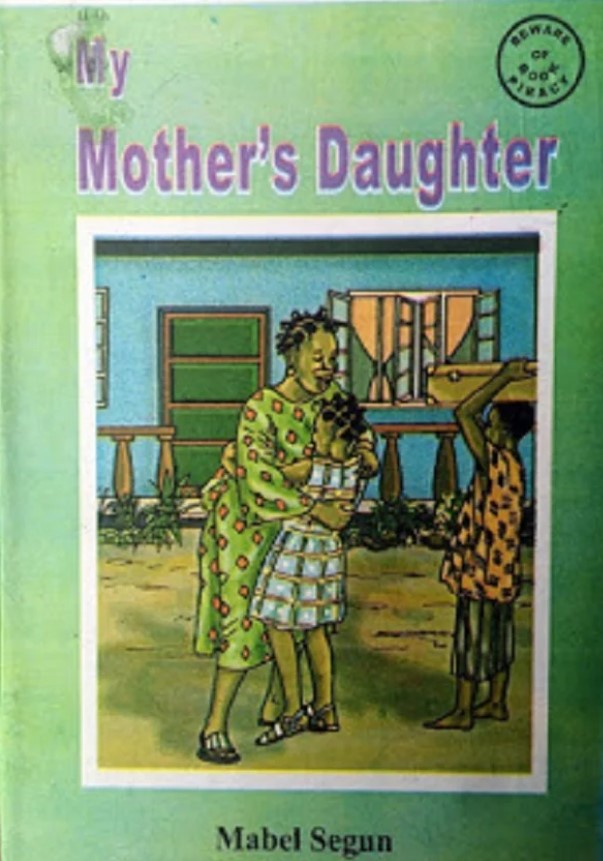
Her classmate at University College, Ibadan, Grace Alele-Williams, who was the first Nigerian woman to receive a doctorate degree and the first woman to be a vice chancellor, seemed to have a better understanding of the female experience in a society driven by patriarchal ideals and expectations.
Williams was, very much during the course of her life, engaged in the promotion of female education, and went as far as introducing non-degree programmes that allowed older women working as elementary teachers to receive certificates—an initiative that would have been of great benefit to Eunice Aig-Imoukhuede.
Mabel Segun was not only a writer of children’s stories. She was a broadcaster (she won the Nigerian Broadcasting Corporation 1977 Artiste of the Year award), pianist, advertising copywriter, editor, and essayist.
Her collection of nonfiction, Sorry, No Vacancy (1985), compiled from her radio broadcasts, is a good-natured look at Nigerian life, and was first published as Friends, Nigerians, Countrymen in 1965. Two years after Sorry, No Vacancy, she published a collection of poetry titled Conflict and Other Poems.
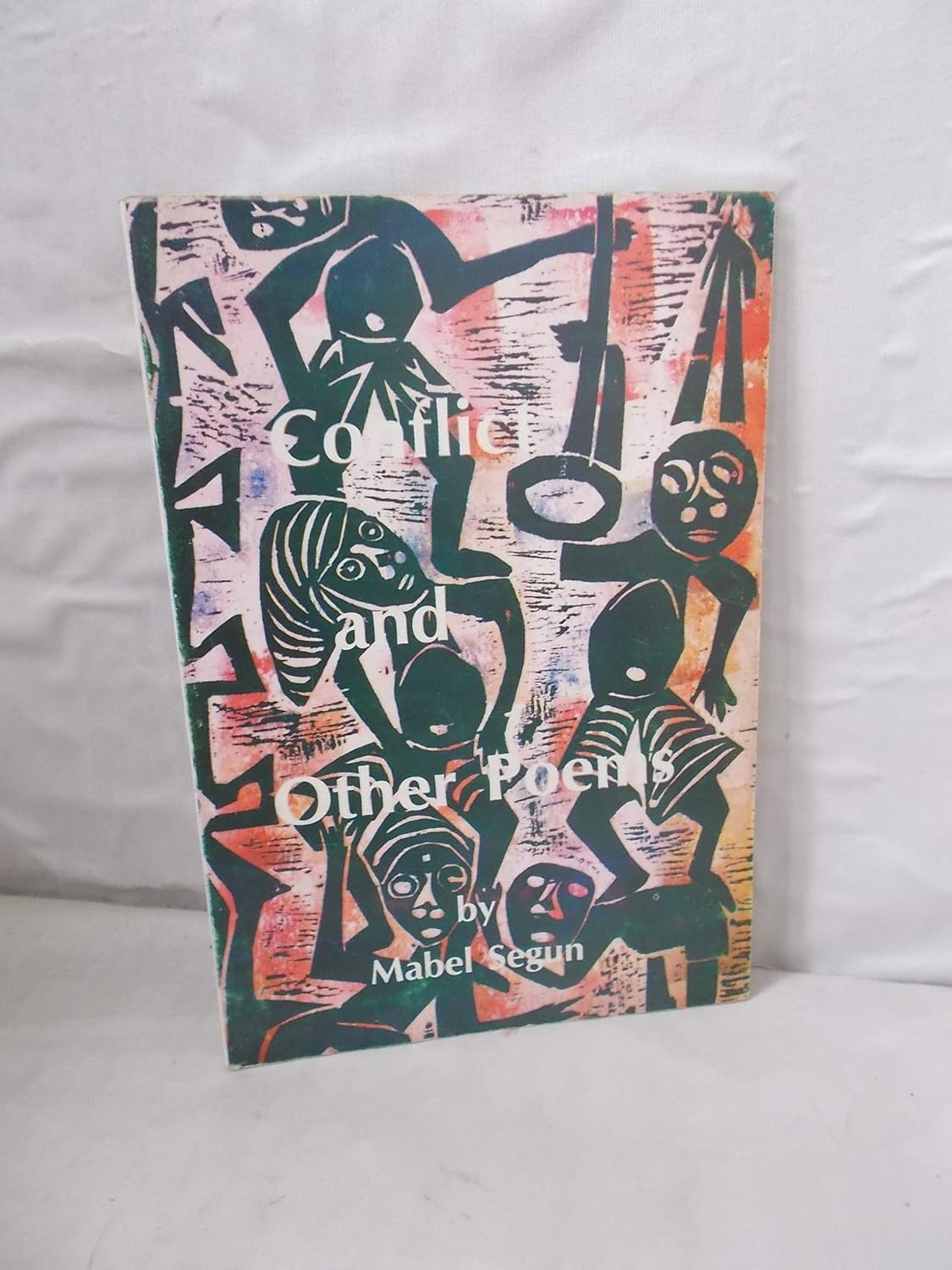
One of her most anthologised poems is ‘The Pigeonhole’. In the poem, the persona bemoans her inability to categorise herself, how she escapes definition, how she could never know “which part of me will be supreme – the old and tested one, the present or the future unknown”.
My first encounter with Mabel Segun was ‘The Pigeonhole’, included in Collected Poems for Secondary Schools by Oladele Taiwo. I was in JSS1 and the poem intrigued my embryonic mind as did the accompanying illustration.
The erring boy, his tattered garments oozing delinquency, bowed his head sullenly beside the policeman who was by the doorpost. What the mother did or how her reaction was depicted I do not recall, but the lines stayed with me, a representation of poetry’s power of awe, impression, and its ability to sear itself into the very sinews of the mind.
Another poem which has been a constant fixture of my life over the years is “Sea-Fever” by British poet laureate, John Masefield. I first read the poem as a preteen and the sheer rhythmic intensity of the lines, and the pelagic force of the stanzas and how they carry the narrative have followed me into adulthood.
Occasionally, when hungry for a poem capable of making me hear rather than emote, I go to “Sea-Fever”. Coincidentally, it was one of Mabel Segun’s favourite poems, having been introduced to her by one of her old school teachers, Ms Ore Cole. So entrancing was the poem to her that she was determined to be a sailor even though it wasn’t a possible career path for women back then.
She never became a sailor but Masefield’s ship rocked on the waters of her mind and mine. In the way she was inspired, so was I (and many others) inspired by her.
One wonders what the future of children’s literature in Nigeria is, if there will be any children’s writers wielding as much star power and global recognition as she did. Her generation had Cyprian Ekwensi, Onuora Nzekwu, Kola Onadipe, Anezi Okoro, and several others.
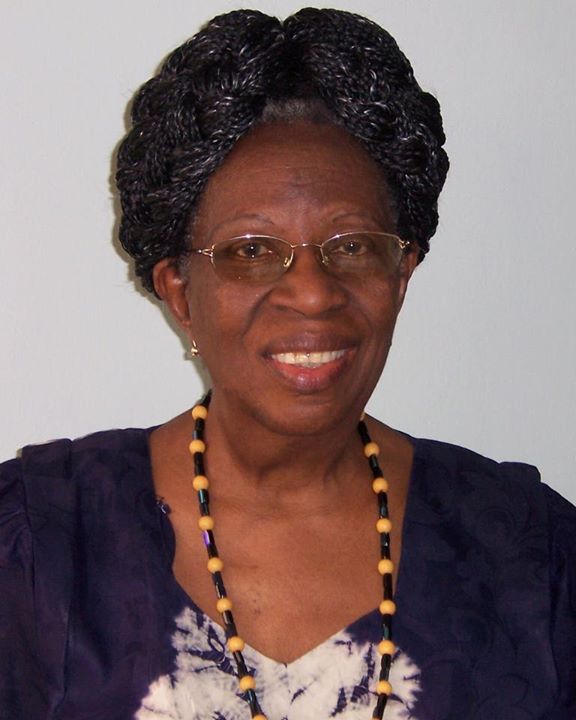
The existing publishing infrastructure for children’s literature poses the question of whether such a golden age is once again possible. It could have been better, no doubt, but there existed a sizable number of imprints in the 80’s and 90’s dedicated to children’s and young people’s literature.
There was Lantern Books, Pacesetters, and The UBE Reader Boosters Initiative. The absence of such an infrastructure today seems to be a verdict on the vitality of children’s literature, and Mabel Segun’s passing hits with the force a final nail hammered into remains of a bygone era.
But this is no time to bemoan or berate. She had a long, rich, passionate life—one worthy of celebration—which manifested itself in her many endeavours and preoccupations. In 1978, she founded the Children’s Literature Association of Nigeria, and in 1990, she set up the Children’s Documentation and Research Centre in Ibadan.
Her work did not go by without recognition; in addition to being a fellow of the International Youth Association in Munich, she was awarded the LNG Nigeria Prize for Literature in 2007 (as a joint winner with Akachi Adimora-Ezeigbo), and two years later received the Nigerian National Order Merit Award for lifetime achievements.
We can say the father’s daughter played her part, and played it how she knew best; now, she has journeyed homewards.
Onyekachi Iloh is a writer, poet and visual artist exploring photography as a means of documentation and the re-examination of sight. He is a winner of the Quarterly West Prize from Quarterly West at the University of Utah, and the Oxford Brookes International Poetry Prize from the Faculty of Humanities and Social Sciences, Oxford Brookes University. In 2023, he was a selected fellow for the Oxbelly Writers’ Retreat at Costa Navarino, Greece, under the directorship of Chigozie Obioma. He is also a winner of the Sony World Photography Awards 2024. He has been part of group exhibitions in London, Aba, and Berlin.




